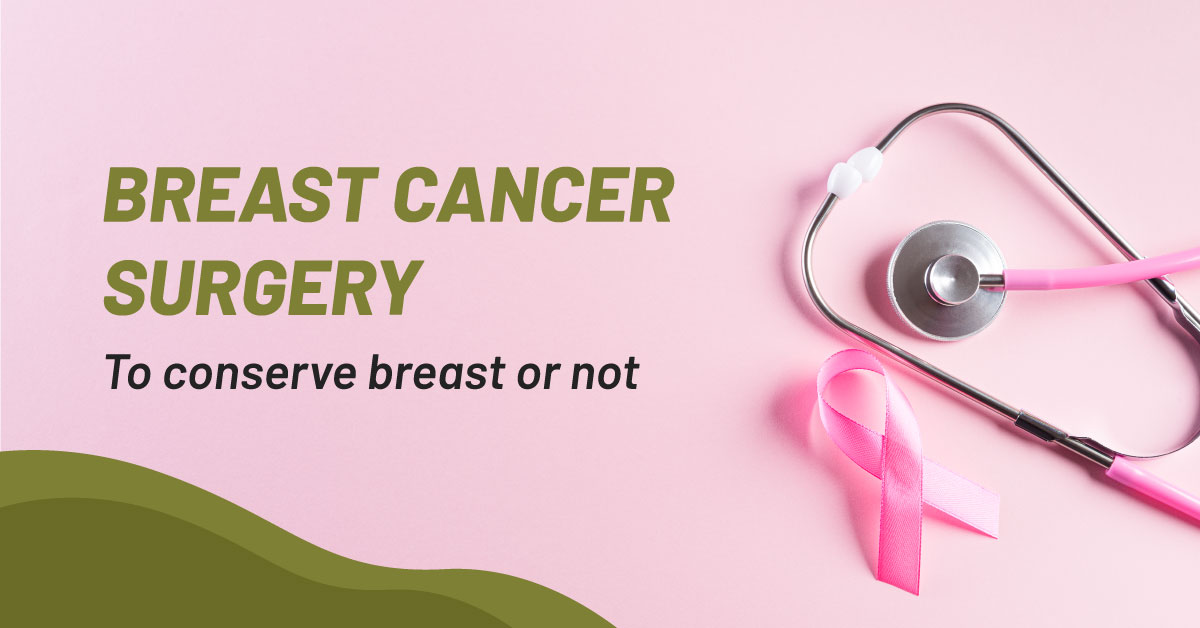Breast Cancer Surgery: To Conserve Breast or Not
Author:
Dr. Poovamma C U, Consultant – Oncoplastic Breast Surgery
Undergoing breast surgery for cancer is always difficult. To save the breast or not is a hard choice. Talk to your surgeon if you have a choice of breast conservation with radiation therapy. Breast conservation may not be possible if you have large tumour to breast size, multiple tumours within the breast, or extensive skin involvement due to cancer.
As long as it is safe to save the breast, there is no right or wrong choice. Choose the option that’s right for you. Survival is the same, no matter which option you choose, breast conservation or mastectomy.
The decision for other therapies like chemotherapy, hormone therapy and /or HER2 targeted therapy is based on the subtype of breast cancer, i.e. the tumour’s characteristics. The type of breast cancer surgery does not alter the requirement of these drug therapies.
In some cases, preoperative therapy /neoadjuvant therapy (chemotherapy, hormone therapy and/or HER2-targeted therapy before breast cancer surgery) may shrink a tumour enough to conserve a breast, where mastectomy was the only option available previously.
Personal Preferences
Personal preference matters a lot when deciding between breast conservation/ lumpectomy and mastectomy. Some women really wish to keep their breasts, while for others, mastectomy offers peace of mind.
Survival
Survival with lumpectomy plus radiation therapy is the same as with mastectomy. Both of these processes lower the risk of dying from breast cancer.
Breast Cancer Recurrence
Breast cancer recurrence varies greatly from person to person; it varies by breast cancer stage at diagnosis and the subtype (hormone-positive/ triple-negative, HER2 positive) of breast cancer.
Localised breast cancer(cancer only in the breast), has 99% 5-year survival rates, regional breast cancer (cancer in breast and lymph nodes) has 86% 5-year survival rate.
Compared to mastectomy, there’s a slightly higher risk, about 1%/year, of local recurrence (cancer returning within the breast) with lumpectomy.
The risk of cancer spreading to other parts of the body (distance recurrence) is the same for both procedures.
Risks and Benefits of Mastectomy Versus Lumpectomy Plus Radiation Therapy
The main benefit of lumpectomy plus radiation therapy is the breast is preserved as much as possible.
A potential benefit of mastectomy is radiation therapy may be avoided. Although some women will need radiation therapy after mastectomy, many will not.
What to Expect After Breast Cancer Surgery
Pain and Numbness
With either type of breast cancer surgery, you will have some soreness in your chest, underarm and shoulder.
After lumpectomy, you’re likely to have numbness along the surgical scar. After a mastectomy, you’ll be numb across your chest. You may get some feeling back over time, but it will never be the same as before breast cancer surgery.
If you have breast reconstruction at the same time as the mastectomy, this discomfort can be more intense.
When lymph nodes in the underarm area (axillary nodes) are removed during surgery, you may also have some numbness and a burning feeling under and behind your arm.
Lymphedema
When axillary lymph nodes are removed during breast cancer surgery, there’s some risk of lymphedema, a condition where fluid collects in the arm (or other areas such as the hand, fingers, chest/breast or back), causing it to swell.
Total Mastectomy versus Lumpectomy plus radiation therapy
| Conditions | Total Mastectomy | Lumpectomy plus radiation therapy |
| Treatment for breast cancer | Very effective | Very effective |
| Amount of tissue removed | Entire breast | Part of the breast (tries to keep the original look of the breast) |
| Hospital stay | Same | Same |
| Radiation therapy | Sometimes done | Almost always done |
| Temporary soreness of chest, underarm and shoulder | Same | Same |
| Chance of recurrence in the breast (local recurrence) | Very low for early stages of breast cancer | Low for early stages of breast cancer (but slightly higher than with mastectomy) |
| Chance of recurrence outside the breast (distant recurrence) | Same | Same |
| Chance of lymphedema (depends on extent of axillary surgery) | Yes | Yes |
Talk to your health care provider about whether breast conservation is an option for you and what breast cancer treatments are best for you. This can help you feel you’re getting the best care possible.





